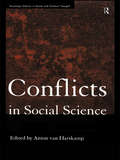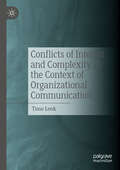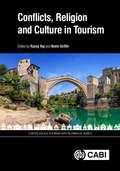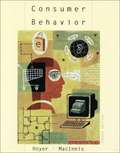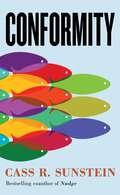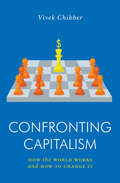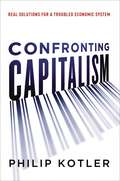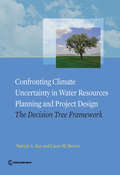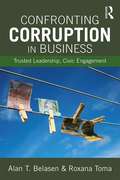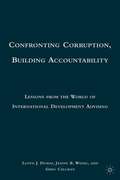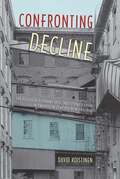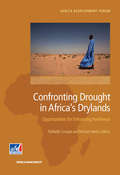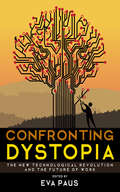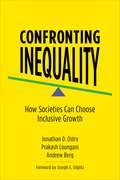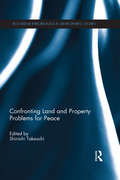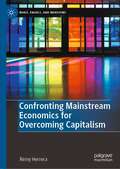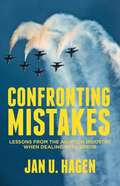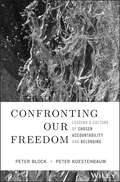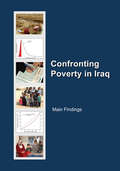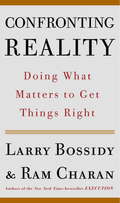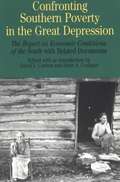- Table View
- List View
Conflicts and Conflict Dynamics in Business Families: Dealing with Internal Family Disputes (Business Guides on the Go)
by Tom A. Rüsen Arist von SchlippeConflicts within the owner circle - or rather, within the "family of the family business" - are often the main cause of existential crises for family businesses. The damaging effects of unchecked family conflicts affect two social systems: the family business and the business family itself. The impairment of the survival capability of the family business goes hand in hand with the reduced chance of constructive follow-up communication between family members. Once caught up in conflict communication, it is extremely difficult for business families to get out of it without the help of external knowledge. It is therefore surprising that the topic of conflict prevention in business families has so far been given relatively little attention. Against this background, this book takes a closer look at the topic of "Conflicts in the Business Family" and deals with a number of topics that are essential to understanding the subject: the specific challenges and conflicts that business families typically face, as well as practically proven methods of conflict resolution at different levels. The content is based on the experiences that the two authors have gained in a variety of research projects, conflict moderation, and family strategic consulting projects over the past 18 years. The key findings from this wealth of experience are now made available to the general public.
Conflicts in Social Science (Routledge Studies in Social and Political Thought)
by Anton Van HarskampThrough detailed case studies, the contributors look at conflicts in social science arguing that they must be resolved at the level of the individual discipline rather than at the level of philosopy. They explore different ways in which social scientists deal with the tension of being simultaneously party to a conflict and a contributor its settlement.
Conflicts of Interest and Complexity in the Context of Organizational Communication
by Timo LenkConflicts of interest and competing demands are a defining feature of complex, rapidly changing societies. They shape all forms of organizations, which are confronted both internally and externally with a multitude of heterogeneous and often incompatible interests and expectations. For example, companies are expected to become climate-neutral while remaining profit-oriented; politics must drive societal transformation without jeopardizing prosperity and jobs; and NGOs operate within the context of conflicting geopolitical interests. Drawing on paradox perspectives in organizational research and employing complexity theory and assemblage theory, this study explores the social complexity of such conflicts of interest and competing demands. The focus lies on organizational communication. Through international and interdisciplinary references, the study reveals the diversity and multidimensionality of these contradictions. Exploratory expert interviews with consultants provide insights into concrete conflicts of interest, as well as the intricate tensions that arise for organizations. The resulting model is an assemblage theory of contradictions.
Conflicts of Interest at Bell Bank
by Jonas HeeseIn 2013, two employees debated whether to blow the whistle on their employer, Bell Bank, after completing an internal review that revealed undisclosed conflicts of interest. Bell Bank's Asset Management business disproportionately invested clients' money in Bell Bank's mutual funds over funds managed by other banks, letting Bell Bank collect additional fees-and the bank had not disclosed this conflict of interest to clients. Both employees agreed that failing to disclose the conflict was a problem, but beyond that, they saw the situation very differently. One employee, Neel, perceived the internal review as a good-faith effort by Bell Bank's senior management to identify and address the problem. The other, Akash, thought that the entire business model was problematic, even with a disclosure, and believed that Bell Bank may have even broken the law. They considered their options: Should they escalate the issue internally or report it to Bell Bank's board of directors? Should they go even further and report their findings to the U.S. Securities and Exchange Commission? What would the potential risks and rewards of speaking out be?
Conflicts, Religion and Culture in Tourism
by Razaq Raj Kevin A. GriffinConflicts, Religion and Culture in Tourism highlights the role of religious tourism and pilgrimage as a tool for improving cultural relations. Helping to form culture and society worldwide, faith plays a vital part in cross-cultural conflict resolution and opening dialogue across peoples. This book shows how faith and activism can respond to the common challenges of peace making and coexistence both within and among the world's many traditions. The book: - contains diverse empirical research insights on aspects of religious traditions, conflicts and challenges; - presents a range of contemporary case studies, across ancient, sacred and emerging tourist destinations as well as new forms of pilgrimage, faith systems and quasi-religious activities; - provides a global perspective, including contributions from Europe, Asia and the Americas. Conflicts, Religion and Culture in Tourism provides a timely assessment of the increasing linkages and interconnections between religious tourism and secular spaces on a global stage. Written from a multidisciplinary perspective, it provides an invaluable resource for those studying and researching religion, tourism and cultural management.
Conflicts, Religion and Culture in Tourism (CABI Religious Tourism and Pilgrimage Series)
by Yasin Bilim Professor Maximiliano Korstanje Ayesha Chowdhury Maite Echarri-Chavez Necmeddin Guney Tinka Delakorda Kawashima Katerina Kikilia Lourdes Cisneros Mustellier Dimitrios Mylonopoulos Moira Polyxeni Özgür Özer Balal Qayum Jan Rája Manas Ranjan Sanjeev Singh Kartikeya Sonker Rukeya Suleman Panagiota Vasilopoulou Pierre WiktorinConflicts, Religion and Culture in Tourism highlights the role of religious tourism and pilgrimage as a tool for improving cultural relations. Helping to form culture and society worldwide, faith plays a vital part in cross-cultural conflict resolution and opening dialogue across peoples. This book shows how faith and activism can respond to the common challenges of peace making and coexistence both within and among the world's many traditions. The book: - contains diverse empirical research insights on aspects of religious traditions, conflicts and challenges; - presents a range of contemporary case studies, across ancient, sacred and emerging tourist destinations as well as new forms of pilgrimage, faith systems and quasi-religious activities; - provides a global perspective, including contributions from Europe, Asia and the Americas. Conflicts, Religion and Culture in Tourism provides a timely assessment of the increasing linkages and interconnections between religious tourism and secular spaces on a global stage. Written from a multidisciplinary perspective, it provides an invaluable resource for those studying and researching religion, tourism and cultural management.
Conformity and Conflict: Readings in Cultural Anthropology
by James Spradley David MccurdyCultural anthropology has a twofold mission: to understand other cultures and to communicate that understanding.
Conformity: The Power of Social Influences
by Cass R Sunstein Robert H FrankThe New York Times–bestselling coauthor of Nudge reveals the appeal—and the danger—of conformity: &“Fascinating and surprising revelations.&” —GQ We live in an era of tribalism, polarization, and intense social division—separating people along lines of religion, political conviction, race, ethnicity, and sometimes gender. How did this happen? In Conformity, Cass R. Sunstein argues that the key to making sense of living in this fractured world lies in understanding the idea of conformity—what it is and how it works—as well as the countervailing force of dissent. An understanding of conformity sheds new light on many issues confronting us today: the role of social media, the rise of fake news, the growth of authoritarianism, the success of Donald Trump, the functions of free speech, debates over immigration and the Supreme Court, and much more. Lacking information of our own and seeking the good opinion of others, we often follow the crowd, but Sunstein shows that when individuals suppress their own instincts about what is true and what is right, it can lead to significant social harm. While dissenters tend to be seen as selfish individualists, dissent is actually an important means of correcting the natural human tendency toward conformity and has enormous social benefits in reducing extremism, encouraging critical thinking, and protecting freedom itself. Sunstein concludes that while much of the time it is in the individual&’s interest to follow the crowd, it is in the social interest for individuals to say and do what they think is best. A well-functioning democracy depends on it. &“Eminently relevant . . . a must-read.&” ―Booklist
Confronting Budget Deficits
by International Monetary FundA report from the International Monetary Fund.
Confronting Capitalism: How the World Works and How to Change It
by Vivek ChibberA strategic guide to building a more democratic and egalitarian futureWhy is our society so unequal? Why, despite their small numbers, do the rich dominate policy and politics even in democratic countries? Why is it so difficult for working people to organize around common interests? How do we begin to build a more equal and democratic society? Vivek Chibber provides a clear and accessible map of how capitalism works, how it limits the power of working and oppressed people, and how to overcome those limits. The capitalist economy generates incredible wealth but also injustice. Those who own the factories, hotels, and farms always have an advantage over the people who rely on that ownership class for their livelihoods. This inequality in power and income is reflected in the operation of the state, where capitalists are able to exert their will even under relatively democratic conditions. The most important reason is that states depend on the employment and profits from capitalist enterprise for both finances and legitimacy. Every meaningful victory for working people has been won through collective struggle but collective action is very difficult to coordinate. In the final section of the book, Chibber walks the reader through some of the historical attempts to build socialism and presents a vision of how we might, perhaps against the odds, build a socialist future.
Confronting Capitalism: Real Solutions for a Troubled Economic System
by Philip KotlerWith the fall of the Berlin Wall, one economic model emerged triumphant. Capitalism--spanning a spectrum from laissez faire to authoritarian--shapes the market economies of all the wealthiest and fastest-growing nations. But trouble is cracking its shiny veneer. In the U.S., Europe, and Japan, economic growth has slowed down. Wealth is concentrated in the hands of a few; natural resources are exploited for short-term profit; and good jobs are hard to find. With piercing clarity, Philip Kotler explains 14 major problems undermining capitalism, including persistent poverty, job creation in the face of automation, high debt burdens, the disproportionate influence of the wealthy on public policy, steep environmental costs, boom-bust economic cycles, and more. Amidst its dire assessment of what's ailing us, Confronting Capitalism delivers a heartening message: We can turn things around. Movements toward shared prosperity and a higher purpose are reinvigorating companies large and small, while proposals abound on government policies that offer protections without stagnation. Kotler identifies the best ideas, linking private and public initiatives into a force for positive change. Combining economic history, expert insight, business lessons, and recent data, this landmark book elucidates today's critical dilemmas and suggests solutions for returning to a healthier, more sustainable Capitalism--that works for all.
Confronting Climate Uncertainty in Water Resources Planning and Project Design
by Casey M. Brown Patrick A. RayConfronting Climate Uncertainty in Water Resources Planning and Project Design describes an approach to facing two fundamental and unavoidable issues brought about by climate change uncertainty in water resources planning and project design. The first is a risk assessment problem. The second relates to risk management. This book provides background on the risks relevant in water systems planning, the different approaches to scenario definition in water system planning, and an introduction to the decision-scaling methodology upon which the decision tree is based. The decision tree is described as a scientifically defensible, repeatable, direct and clear method for demonstrating the robustness of a project to climate change. While applicable to all water resources projects, it allocates effort to projects in a way that is consistent with their potential sensitivity to climate risk. The process was designed to be hierarchical, with different stages or phases of analysis triggered based on the findings of the previous phase. An application example is provided followed by a descriptions of some of the tools available for decision making under uncertainty and methods available for climate risk management. The tool was designed for the World Bank but can be applicable in other scenarios where similar challenges arise.
Confronting Corruption in Business: Trusted Leadership, Civic Engagement
by Alan T. Belasen Roxana TomaConfronting Corruption in Business focuses on the contextual issues that trigger corruption to give the reader a more thorough understanding of destructive leadership. It provides students with a unique, critical perspective on issues of leadership, corruption, and policy in different countries, industries, and companies. While there isn’t a universally agreed upon definition of corruption in social sciences, it generally refers to efforts to secure wealth or power through misusing public power for private gain. This kind of destructive leadership is typically treated as an anomaly, but this book closes the gap in our understanding by highlighting the wider consequences of this behavior within business, and on an international level. Armed with this understanding, one also learns how to mitigate its causes and consequences. Edited by leading experts, the book includes contributions from scholars with international expertise on leadership, strategy, political science, finance, organizational change, and public policy. It is the first book to focus on corruption on the country level and within business, and students in international business, management, ethics, and leadership classes will find it a valuable read.
Confronting Corruption, Building Accountability
by Lloyd J. Dumas Janine R. WedelThe crisis that nearly brought the world's financial house down in 2008 demonstrated clearly that the global economy cannot work where there is widespread deception, corruption and lack of accountability. Corruption and lack of accountability are also key reasons why international development assistance so often fails to deliver on its promise.
Confronting Decline: The Political Economy of Deindustrialization in Twentieth-Century New England (Working in the Americas)
by David Koistinen"Koistinen puts the ‘political’ back in political economy in this fascinating account of New England’s twentieth-century industrial erosion. First-rate research and sound judgments make this study essential reading."--Philip Scranton, Rutgers University--Camden "Well-organized and clearly written, Confronting Decline looks at one community to understand a process that has become truly national."--David Stebenne, Ohio State University "Koistinen’s important book makes clear that many industrial cities and regions began to decline as early as the 1920s."--Alan Brinkley, Columbia University "Sheds new light on a complex system of enterprise that sometimes blurs, and occasionally overrides, the distinctions of private and public, as well as those of locality, state, region, and nation. In so doing, it extends and deepens the insights of previous scholars of the American political economy."--Robert M. Collins, University of Missouri The rise of the United States to a position of global leadership and power rested initially on the outcome of the Industrial Revolution. Yet as early as the 1920s, important American industries were in decline in the places where they had originally flourished. The decline of traditional manufacturing--deindustrialization--has been one of the most significant aspects of the restructuring of the American economy. In this volume, David Koistinen examines the demise of the textile industry in New England from the 1920s through the 1980s to better understand the impact of industrial decline. Focusing on policy responses to deindustrialization at the state, regional, and federal levels, he offers an in-depth look at the process of industrial decline over time and shows how this pattern repeats itself throughout the country and the world.
Confronting Drought in Africa's Drylands: Opportunities for Enhancing Resilience
by Michael Morris Raffaello CervigniDrylands are at the core of Africa's development challenge. Drylands make up about 43 percent of the region's land surface, account for about 75 percent of the area used for agriculture, and are home to about 50 percent of the population, including a disproportionate share of the poor. Due to complex interactions among many factors, vulnerability in drylands is high and rising, jeopardizing the long-term livelihood prospects for hundreds of millions of people. Climate change, which is expected to increase the frequency and severity of extreme weather events, will exacerbate this challenge. African governments and their partners in the international development community stand ready to tackle the challenges confronting drylands, but important questions remain unanswered about how the task should be undertaken. Do dryland environments contain enough resources to generate the food, jobs, and income needed to support sustainable livelihoods for a fast growing population? If not, can injections of external resources make up the deficit? Or is the carrying capacity of drylands so limited that outmigration should be encouraged? Based on analysis of current and projected future drivers of vulnerability and resilience, the report uses an original modeling framework to identify promising interventions, quantify their likely costs and benefits, and describe the policy trade-offs that will need to be addressed. By 2030, economic growth leading to structural change will allow some of the people living in drylands to transition to non-agriculture based livelihood strategies, reducing their vulnerability. Many others will continue to rely on livestock keeping and crop farming. For the latter group, a number of "best bet ? interventions have the potential to make a significant difference in reducing vulnerability and increasing resilience. This report evaluates the opportunities and challenges associated with these interventions, and it draws a number of conclusions that have important implications for policy making.
Confronting Dystopia: The New Technological Revolution and the Future of Work
by Eva PausIn Confronting Dystopia, a distinguished group of scholars analyze the implications of the ongoing technological revolution for jobs, working conditions, and income. Focusing on the economic and political implications of AI, digital connectivity, and robotics for both the Global North and the Global South, they move beyond diagnostics to seek solutions that offer better lives for all. Their analyses of the challenges of technology are placed against the backdrop of three decades of rapid economic globalization. The two in tandem are producing the daunting challenges that analysts and policymakers must now confront.The conjuncture of recent advances in AI, machine learning, and robotization portends a vast displacement of human labor, argues the editor, Eva Paus. As Confronting Dystopia shows, we are on the eve of—indeed we are already amid—a technological revolution that will impact profoundly the livelihoods of people everywhere in the world.Across a broad and deep set of topics, the contributors explore whether the need for labor will inexorably shrink in the coming decades, how pressure on employment will impact human well-being, and what new institutional arrangements—a new social contract, for example, will be needed to sustain livelihoods. They evaluate such proposals as a basic income, universal social services, and investments that address key global challenges and create new jobs.Contributors:Vandana Chandra, Mignon Duffy, Dieter Ernst, Vincent Ferraro, Martin Ford, Juliana Martinez Franzoni, Irmgard Nubler, Robert Pollin, David Rueda, Diego Sanchez-Ancochea, Guy Standing, Stefan Thewissen
Confronting Inequality: How Societies Can Choose Inclusive Growth
by Prakash Loungani Jonathan D. Ostry Andrew BergInequality has drastically increased in many countries around the globe over the past three decades. The widening gap between the very rich and everyone else is often portrayed as an unexpected outcome or as the tradeoff we must accept to achieve economic growth. In this book, three International Monetary Fund economists show that this increase in inequality has in fact been a political choice—and explain what policies we should choose instead to achieve a more inclusive economy.Jonathan D. Ostry, Prakash Loungani, and Andrew Berg demonstrate that the extent of inequality depends on the policies governments choose—such as whether to let capital move unhindered across national boundaries, how much austerity to impose, and how much to deregulate markets. While these policies do often confer growth benefits, they have also been responsible for much of the increase in inequality. The book also shows that inequality leads to weaker economic performance and proposes alternative policies capable of delivering more inclusive growth. In addition to improving access to health care and quality education, they call for redistribution from the rich to the poor and present evidence showing that redistribution does not hurt growth. Accessible to scholars across disciplines as well as to students and policy makers, Confronting Inequality is a rigorous and empirically rich book that is crucial for a time when many fear a new Gilded Age.
Confronting Land and Property Problems for Peace (Routledge Explorations in Development Studies)
by Shinichi TakeuchiThis collection clarifies the background of land and property problems in conflict-affected settings, and explores appropriate policy measures for peace-building. While land and property problems exist in any society, they can be particularly exacerbated in conflict-affected settings – characterized by unstable security, weak governance, loss of proper documentation as well as the return of refugees and Internally Displaced Persons. Unless these problems are properly addressed, they can destabilize fragile political order and hinder economic recovery. Although tackling land and property problems is an important challenge for peace-building, it has been relatively neglected in recent debates about liberal peace-building as a result of the strong focus on state-level institution building, such as security sector reforms and transitional justice. Using rich original data from eight conflict-affected countries, this book examines the topic from the viewpoint of State-society relationship. In contrast to previous literature, this volume analyses land and property problems in conflict-afflicted areas from a long-term perspective of state-building and economic development, rather than concentrating only on the immediate aftermath of the conflict. The long-term perspective enables not only an understanding of the root causes of the property problems in conflict-affected countries, but also elaboration of effective policy measures for peace. Contributors are area specialists and the eight case study countries have been carefully selected for comparative study. The collection applies a common framework to a diverse group of countries – South Sudan, Uganda, Rwanda, Burundi, Cambodia, Timor-Leste, Colombia, and Bosnia-Herzegovina.
Confronting Mainstream Economics for Overcoming Capitalism (Marx, Engels, and Marxisms)
by Rémy HerreraThis book provides analytical arguments that demonstrate the necessity to go beyond not only mainstream economics but also, and especially, the capitalist economy itself. It provides a radical critique of mainstream economics, comparing it to an unscientific form of single thought, and applies this criticism to the specific fields of growth, development, the institutions, defense, or the environment. It targets both neoclassical economics and reformist “soft heterodox” currents, from neoinstitutionalists to neo-Keynesians—including Thomas Piketty or Amartya Sen, among others. In doing so, it rejects Keynes’ theories of money, the crisis, and the state. It then offers a Marxist interpretation of the current crisis of capitalism, considering it as a systemic crisis without solutions internal to its own logic and dynamics, and emphasizes the links between this capitalist crisis and imperialist wars, and the destruction of the environment and natural resources by capital. The book concludes by arguing that we must find the necessary theoretical and practical alternatives in a Marxist perspective, advocating for socialist transitions away from the capitalist economy to protect humanity and the environment.
Confronting Mistakes
by Jan U. HagenIn most organizations, errors - although common and unavoidable - are rarely mentioned bottom-up. Using this example of the high risk aviation industry this book assess how active error management can work and lead to success. Using academic research and 10 actual aviation accidents cases, this book will provide compelling and informative reading.
Confronting Our Freedom: Leading a Culture of Chosen Accountability and Belonging
by Peter Block Peter KoestenbaumExplore the nature of modern leadership In Confronting Our Freedom, a team of dedicated leadership coaches delivers an exciting and engaging new take on management and leadership. Drawing on recent events in the market and in the world, including the Great Resignation, the COVID-19 pandemic, and widespread digital transformation, the authors invite you to reimagine ideas of freedom and accountability in the context of work. You’ll explore how freedom of action—for managers and employees—is what gives rise to true accountability, both in the community and in the workplace. In the book, you’ll also find: Discussions of the power and structure of freedom, including its implications for our own choices and lives Ways to shift the focus of your leadership and management to accountability and freedom Strategies for shifting the illusion of clear roles and expectations to one compatible with fully human organizationsA groundbreaking and incisive approach to managing and leading others in virtual, hybrid, and in-person settings, Confronting Our Freedom will be an eye opener for managers, executives, and other business leaders seeking to improve their ability to inspire others to their fullest potential.
Confronting Poverty in Iraq: Main Findings
by World BankThis report provides the most comprehensive and rigorous analysis of Iraqi income and expenditure in several decades. The report makes extensive use of the Iraq Household Socio-Economic Survey, the first nationwide income and expenditure survey since 1988. IHSES data is complemented income and expenditure data from a wide range of other measures of living standards, allowing us to analyze living standards in a holistic way. The analysis presented here was performed with two main goals-first, to inform the Government's Poverty Reduction Strategy; and second, to serve as a baseline for future assessments of changes in living standards and the identification of critical issues for deeper examination. Iraqi living standards have two unusual characteristics. First, they have fallen over the past generation. Second, they feature surprisingly little inequality. These characteristics are both rooted in Iraq's recent history of authoritarian government, war, military occupation, insurgency, and civil strife leading to infrastructure destruction and population displacement. There have been few opportunities for individuals to prosper from professional or entrepreneurial activities. Decades of neglected investment have resulted in deterioration of social services and economic infrastructure. Consequently, individuals have lacked capabilities to prosper and an investment climate conducive to prosperity. School enrollment and life expectancy have declined. Extremely low returns to education reflect the combination of poor educational quality and lack of employment opportunities. In terms of economic infrastructure, access to reliable electricity and water, and even access to paved roads are low, are further reflections of decades of neglect. While the upper end of the distribution has been pulled down by a lack of opportunities, the lower end has been supported by direct government provision of food. The Public Distribution System (PDS) provides 85 percent of food needs. While PDS has been useful as a safety net for the poor and the vulnerable, the system is expensive, inefficient, and fiscally risky. Indeed, PDS food rations account for a far greater share of public spending than does education or health. Going forward, Iraq faces two main challenges. First, although Iraq does not have to develop from scratch, it faces a formidable challenge in re-development. Second, a shift by the Government is required-from direct provision of basic subsistence toward investment in human capacities. The Government can provide an enabling environment through investments in economic infrastructure and services to business and citizens, thus allowing the population to make productive use of education and their own labor. Both challenges are now being taken up by the Poverty Reduction Strategy, which articulates a detailed set of required actions and outlines priorities for government spending.
Confronting Reality: Doing What Matters to Get Things Right
by Larry Bossidy Ram CharanThe tectonic plates of business are shifting and the result is a new reality in what it takes to run a profitable, successful business. The authors of EXECUTION show what it takes to muster the intellectual and personal courage to understand the fundamental issues at the core of your business and provide the tools for taking action. 'Confronting reality' is the ability to see the world the way it really is, not the way you would like it to be. CONFRONTING REALITY provides the tools that will build the foundation for future prosperity and success: - How to focus on your external industry, not just your direct competitors- How to prepare a strategy that confronts reality - How to design rewards and link them to performance- How to reframe and reposition a business to ensure maximum success
Confronting Southern Poverty in the Great Depression: The Report on Economic Conditions of the South with Related Documents
by Peter A. Coclanis David L. CarltonThe National Emergency Council's 1938 Report on Economic Conditions of the South caused Franklin Roosevelt to view the south as "the Nation's #1 economic problem" and quickly became a standard part of modern Southern history. This important and out-of-print document is reprinted here, along with primary accounts of the Depression-era South, statistical data, and contemporary reactions to the Report.

